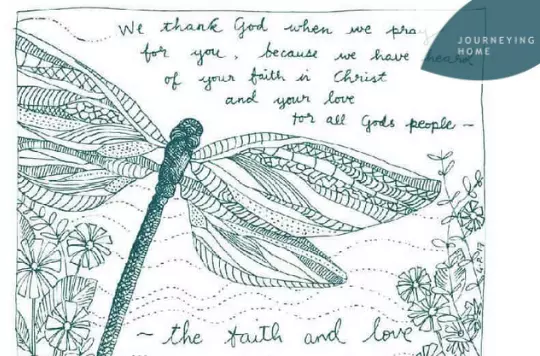The Salvation Army’s missional statement is to ‘Love God and Love Others’. Therefore there will be times when we are called to help and protect those in our care. In this reflection, we will consider scriptural truths that help us navigate and reflect upon death and dying within the Christian faith, and the hope that we have of eternal life.
All of us will have to face the human reality of death at some point, both for ourselves and also for those we care for and love. Death and dying is not a topic often spoken about in our society, yet denying that this ‘life event’ will happen is denying the truth of the inevitable. Life and death are intrinsically linked, as seen in the death of Jesus Christ who through his atoning death brought eternal life for all who believe.
What does the Bible say about Death and Dying?
‘For we who are alive are always being given over to death for Jesus’ sake, so that his life may be revealed in our mortal body. So then, death is at work in us, but life is at work in you.’ (2 Corinthians 4:11-12)
‘Therefore we do not lose heart. Though outwardly we are wasting away, yet inwardly we are being renewed day by day.’ (2 Corinthians 4:16-18)
To live for ever is not an option, and the Bible makes it clear that to live for ever in a fallen world would simply not be healthy, but a curse. The blessing is to actively face death, even with human fear of the unknown of how that will feel or appear, so that we partner with Christ in letting go of ourselves from this earthly life to our life in Heaven.
Rob Moss writes: ‘Spiritually a dying person is very much alive … (as they) are outwardly wasting away but internally growing.’ Therefore we seek to look beyond our own humanity to a spiritual awakening of the reality to come in eternity. Jesus himself speaks to his disciples about the journey of death when he says: ‘When everything is ready, I will come and get you, so that you will always be with me where I am’ (John 14:3 NLT). We do not tread this path alone because we have a Saviour who takes us from life as we know it to eternal life on our continued path of faith.
John Dunlop, a Christian physician with a wealth of experience of caring for those who are dying, states that ‘dying well is rarely a coincidence. Rather it results from choices made throughout life … Dying well is nothing more than living well right up until the end.’ Viewing death as another life event and acknowledging this life event may help change the view of death from being the ‘final act’ to being another part of our journey to eternal life with Christ.
Confronting death is nothing new to humanity. A document entitled Ars moriendi (The Art of Dying) was produced during the 1400s for those who had no access to a priest in their final moments on earth. This time in history brought death to the forefront of people’s minds as there was no telling when disease would knock at the door. Ars moriendi became a companion to those who were healthy and living, preparing them for their last moments. From this we can learn that facing our own mortality, seeking forgiveness, offering confession and a soul’s preparation for death removes denial and brings acceptance.
Acceptance brings the art of ‘letting go’. As Dr John Wyatt articulates so well, ‘Dying well is an opportunity for me to let go of tasks that I will never complete and responsibilities that I can no longer maintain. It is a chance to accept that God is in control of my life and that I need to let go, particularly of those parts of my life where I am still desperately grasping on to the things of this earth.’
There is no escaping, however, the fact that death brings suffering in human terms. This is when looking to the cross of Christ, considering how Jesus himself suffered and died, is imperative. There was no medicine to ease Christ’s pain. He endured real death on a cross and therefore he understands our own pain. Death brings suffering to the body, the heart and the mind. Jesus himself urges us: ‘As I have loved you, so you must love one another’ (John 13:34). Therefore, the progressing loss of a loved one brings sadness, often despair and a deep pain which we wish to acknowledge for all who have loved another. Vigen Guroian writes: ‘Death would not be so bitter were it not that love makes life so sweet.’ We need to acknowledge the pain of others, and we too will potentially fear and feel when death is approaching.
Death and dying calls for a dependency upon God, but also upon others. Often watching others cope with your own suffering is painful. We acknowledge this, and as a Salvation Army want to acknowledge grief in all its human terms alongside the promise of hope found in Heaven. ‘In the painful reality of dependence, we experience a tiny reflection of what God, out of love, chose for himself’ (John Wyatt).
Dying is a social, family and life event, and one that is better not to be taken alone but with those who will stand with the one who is journeying from life to death. Jesus himself was found weeping in the Garden of Gethsemane, and he had friends whom he asked to stand, watch, pray with him and simply be with him as he came to terms with his imminent death. Through history we have seen changes in medicine and so often our view of death has become very clinical. But there is still a role of ‘standing with’ those who are making this journey. We should not pass the responsibility to the medics alone, but take our ‘standing with’ seriously. The holding of a hand, singing with, watching with and the pastoral response required for those we love is one of the gifts called from companionship with another. Penelope Wilcock writes that ‘accompanying other people and their loved ones to the gate of death, is to enter holy ground, to stand in an awesome place where the wind of the Spirit blows, to encounter peace and grief, insight, intimacy and pain on a level not found in ordinary living.’
The Salvation Army has a commonly used phrase for someone who has passed from earthly life, through death to eternal life, and the words ‘Promoted to Glory’ are often used at a Salvation Army funeral. This phrase helps us to see beyond our humanity to a spiritual awakening of eternity, and the beauty that awaits us.
As we make our own way through life, our prayer is that you will be constantly aware that in order to die well we must live well. In order to live well we hold on to the words of Jesus when he said: ‘I have come that they may have life, and have it to the full’ (John 10:10). We believe that life on earth is continued into eternity, and this promise is for all who would believe in Christ as their Saviour.
‘For God so loved the world that he gave his one and only Son, that whoever believes in him shall not perish but have eternal life’ (John 3:16).
‘No guilt in life, no fear in death, this is the power of Christ in me; From life’s first cry to final breath, Jesus commands my destiny. No power of hell, no scheme of man, can ever pluck me from his hand; till he returns or calls me home, here in the power of Christ I’ll stand!’ (‘In Christ Alone’, Stuart Townend and Keith Getty)









